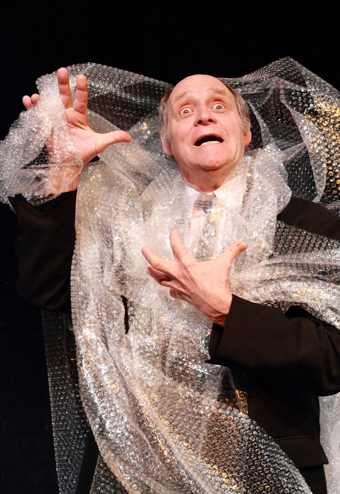What the death wish most desires
Tony Reck: Peter King, John Gabriel Borkman

Jim Daly, John Gabriel Borkman
If the road to perdition is paved with treacherous ice then a pathway into director, Peter King's scathing interpretation of Henrik Ibsen's John Gabriel Borkman sometimes glitters with gold.
As if electrified, male performer Cory Corbett as Borkman’s maniacal wife Gunhild rips away a sheet from 'her' body and the play begins. Upstairs, pacing back and forth for the last decade or so, resides the disgraced title character of this play, John Gabriel Borkman: estranged husband of Gunhild, former lover of her twin sister Ella, hated father of his son Erhart and, above all, a man guilty of embezzlement who has not only destroyed his family's reputation but after spending time in jail, has quietly gone mad in response to a self-imposed exile from what he, Borkman, perceives as a cruel and heartless world. Ibsen's script immediately ensnares its audience in a penultimate endgame. It remains to be seen just who will survive this winter's night, one comprising loneliness and deception, alienation and hatred, insanity and mortifying despair.
King's direction utilises expressionist acting techniques rarely seen in Australian theatre. Jim Daly as Borkman and Russell Walsh as his emotionally deformed acolyte, Vilhelm Fodal, extract from King's direction much humour (some cartoon inspired) and a wistful evocation of the emotional wilderness that characterises most, if not all, the characters in this play. As Borkman is persuaded by his sister-in-law and former lover, Ella, to descend the stairwell of his self-imposed cell and challenge his psychotic wife Gunhild for custody of Erhart, the audience becomes witness to a remarkable display of physical endurance, technical concentration and ensemble acting.
During a four act performance without interval, extending across 100 minutes, the actors form themselves into grotesque physical images, spit out Ibsen's caustic familial vision with cobra-like accuracy and ultimately give expression to the playwright's view of a Christian theology that rages against the dying of its own light. Outside, the universe is cold and uninviting. Borkman's eventual death is not an ascent to heaven but instead, a descent into a symbolic mire. He will die in the snow with a “metal hand” wrenching life from his breast and, perhaps for the first time, God is pronounced dead in a theological wilderness suspended above a bottomless fjord, one carved from granite and ice rather than wrought from any supercilious religious force.
Mounting this production has been director Peter King's obsession, perhaps for some time. His directorial strategies are metaphorical and often abstract. But it remains clear that King himself is precise when considering how he interprets Ibsen's confrontation with the divine, and how he wishes to express this interpretation. That said, and within a bubble-wrapped set designed by Peter Corrigan and succinctly lit by Greg Carroll, the protective walls we erect in our delusional lives are no match for the seething hatreds that drive the thanatological personality. Unrestrained, it will drive each of us into that which Thanatos most desires—an abyss void of God and organised religion, one characterised by secular annihilation and the interminable passing of time.
John Gabriel Borkman, writer Henrik Ibsen, translation Peter Archer, director Peter King, performers Jim Daly, Cory Corbett, Ezuk Doruk, Will Freeman, Russell Walsh, designer Peter Corrigan, lighting Greg Carroll, La Mama, Melbourne, 18-29 Sept
See also Jana Perkovic's account of a 12hour version of John Gabriel Borkman at Theatretreffen, Berlin, 2012
RealTime issue #117 Oct-Nov 2013 pg. web






